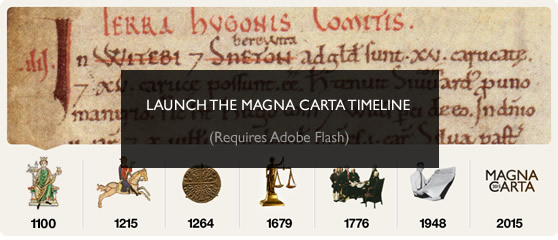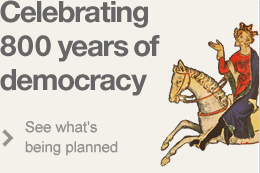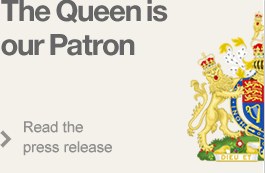
1100 - Coronation of Henry I

Coronation oath of Henry I, 1100, affirmed the principles going back to the laws of King Ethelbert of Kent, circa 604, and subsequent laws of the Kings of Kent leading up to the end of the Millenium.
1215 - Sealing of Magna Carta

Magna Carta is so much more than a peace treaty between a quarrelsome King and his barons, sealed (not signed) in a meadow on the banks of the Thames on 15th June 1215. Its lasting iconic value as the foundation of so many world democracies lies in the power of an idea - a principle, which states that nobody, including the King, is above the law of the land.
1265 - De Montfort’s Parliament

Simon de Montfort, Anglo-Norman rebel noblemen, convened a ‘parliament’ in Westminster on 20th January 1265, which was dispersed around mid March that year. It was not only in defiance of King Henry III, but was radical in having democratically elected knights and borough representatives from throughout the kingdom. The de Montfort Parliament was the first example of its kind in England.
1679 - The Habeas Corpus Act

The Habeas Corpus Act of 1679, was passed during the reign of the restored monarchy of Charles II after the English Civil War. It strengthened the ancient and powerful writ which had been a feature of English Common Law since before Magna Carta. It served to safeguard individual liberty, preventing unlawful or arbitrary imprisonment. Habeas Corpus is Latin for “you may have the body” – subject to legal examination before a court, or a judge.
1776 - Declaration of Independence

The American Declaration of Independence as penned by Thomas Jefferson was instead an indictment of George III’s numerous breaches of English Common Law enshrined within Magna Carta, to which the thirteen colonies were equally bound. It became the legal justification for the American Revolutionary War that had been raging for over a year, by 4th July, 1776.
1948 - The Universal Declaration of Human Rights

The Universal Declaration of Human Rights 1948 has been described as the Magna Carta of our age. Arising from the ashes of WW2 and the unspeakable barbarity of the conflict, it set out basic freedoms, comprising 30 articles to which all humans are entitled. It is safeguarded and underwritten by the United Nations and adopted into the laws of almost every country in the world.
2015 - The 800th Anniversary of the Magna Carta

The 800th anniversary of Magna Carta was an occasion to deepen our understanding of the crucial role it has played in the development of the rule of law, human rights and liberty. 2015 saw local, national and international commemorations. For more information about events that took place click here.
Featured Article
790 years ago, John,the King of England was having a little local difficulty with his barons. His attempts to defend his extensive dominions across the Channel, including Normandy and a considerable portion of western France, had been a disaster...
Read on...Recent Articles
- Magna Carta's American Adventure
- 800th anniversary of Bristol...
- Bristol 800 concert and...
- Emancipation and Magna Carta
- Terrorism and Tolerance -...
- Magna Carta
- Magna Carta Benches mark...
- ABA Magna Carta Memorial...
Stay updated
If you would like to keep informed about the work of the Magna Carta Trust and our partners, please sign up to the newsletter below.
Become a Supporter
There are a number of significant supporter opportunities. Register your interest early to ensure the widest range of options.
Find out more




